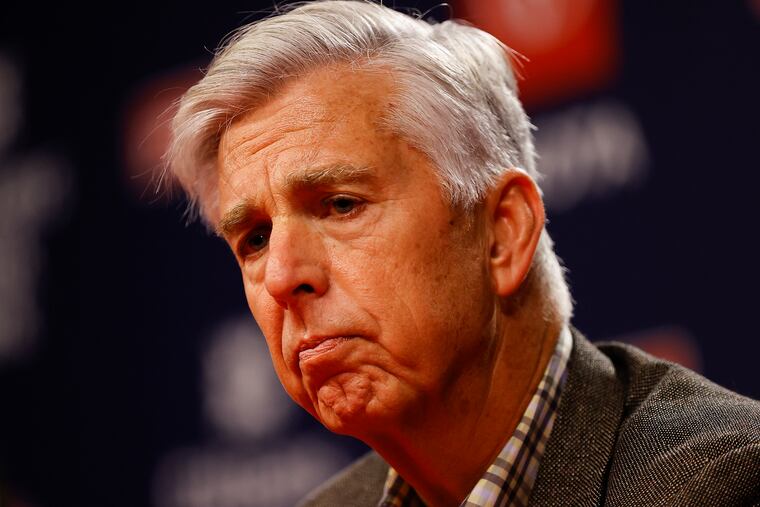Dave Dombrowski exterminates Phillies’ dysfunction
This is a sea change for the team: It’s Dombrowski’s show. John Middleton is now a hands-off owner.

When the Phillies got rid of Joe Girardi before breakfast on Friday morning, they found themselves. They scored 26 runs in three games, their second-highest run total in three straight games this season. Except this time they did it without their starting second baseman, their starting shortstop, and with their everyday center fielder benched for the first two games.
Credit president Dave Dombrowski.
When he fired Girardi, it not only lifted a 10,000-pound burden from the shoulders of the team’s stars, it also shed light on how a long-dysfunctional Phillies franchise operates these days.
Functionally.
Finally.
It’s Dave Dombrowski’s show. John Middleton is a hands-off owner. Dombrowski is no longer saddled with a big-name, big-ego manager married to dogma and doctrine. He has a manager he trusts to decide the lineups and handle the pitching staff.
There are no more owner-led spending sprees. Dombrowski doesn’t need his hand held.
In the recent past, ownership had enthusiastically meddled in the biggest decisions — Jake Arrieta, Bryce Harper, J.T. Realmuto’s arrival via trade — but, according to a longtime Phillies insider, Middleton has handed Dealin’ Dave complete control. Dombrowski has a budget, and he discusses momentous moves with his boss, but he generally gets what he wants.
The most recent evidence: Dombrowski said that, when he began to seriously consider firing Girardi, he discussed it with Middleton, the managing general partner, on Tuesday. According to Dombrowski, Middleton replied, “It’s your decision. Whatever you feel you need to do.”
Even more telling: Middleton did not attend the press conference Friday afternoon at which Dombrowski introduced bench coach Rob Thomson as the interim manager.
Middleton wasn’t even in the back row, where he usually lurks when he wants to be less visible during these sorts of events.
This is a sea change. For the first time since Middleton fired general manager Ruben Amaro Jr. in 2015, it feels like the team is being run properly.
The owner defers to the front office. The front office defers to the manager. The manager manages like a human being, not a robot.
» READ MORE: After firing Joe Girardi, it’s up to Dave Dombrowski to fix the Phillies’ biggest problems
It feels like baseball.
The Dombrowski Era
Dombrowski has again shown that he’s willing to make big moves fast.
He adds fast.
Less than 48 hours after he signed Kyle Schwarber to a $79 million deal in March, Dombrowski approached Middleton to pitch a $100 million deal for Nick Castellanos, which would push the Phillies past the luxury tax for the first time. Middleton, to his credit, was eager to do it.
He subtracts fast.
Less than 72 hours after Dombrowski began seriously considering Girardi’s dismissal, he dismissed him.
He computes up fast.
The Phillies had beaten Gabe Kapler and the Giants on Wednesday to avoid a sweep, but that series was the fifth in a row they’d failed to win. Dombrowski looked ahead. He saw a springboard for Girardi’s replacement.
The Angels were coming in, but they’d lost eight in a row. The Phillies had Thursday off before that series, with another off day Monday, so the bullpen and the position players would be refreshed after L.A. left. The Phillies have three games in Milwaukee, then but then they have 13 games against four teams below .500: the Diamondbacks, Marlins, Nationals, and Rangers. Counting the Angels, that would make 16 out of 19 games against moribund competition.
“If you’re going to make a move,” Dombrowski said, “what time frame makes sense?”
This time frame made sense.
So, Dombrowski struck.
Hands off
He’s willing to let his new manager act with autonomy.
Rookie shortstop Bryson Stott hit the walk-off home run to sweep the Angels on Sunday. Stott started the game at shortstop even though veteran shortstop Didi Gregorius returned from the injured list Sunday. Stott had started the previous three games, was 4-for-10 and had reached base in six of 12 plate appearances, but there was no scenario in which Girardi wouldn’t have started Gregorius, the veteran, on Sunday.
Thomson did. That’s a huge difference.
Many observers mistakenly assumed that decisions regarding the bullpen were made collectively, but Dombrowski clearly did not agree with Girardi’s analytics and sports-science basis for handling pitchers — especially Girardi’s reluctance to use a reliever three days in a row. Thomson said Friday that he would use his gut and feedback from the staff to determine how often he uses relievers:
“We’ll take it case-by-case. If the guy looks you in the eye and says, ‘Hey, I’m good to go,’ and you trust him, then it’s a possibility.”
» READ MORE: Phillies interim manager Rob Thomson has a fan in Mets manager Buck Showalter
What about me?
Dombrowski is willing to accept some blame, too.
“I put the club together. I think we’re better than how we’ve played,” he said.
That the Phillies are the worst defensive team in baseball is neither surprising nor inexcusable. That the Phillies are the dumbest team in baseball is both surprising and inexcusable.
Girardi was to blame.
“We’re not a strong defensive club, but we can be a fundamentally good defensive club,” Dombrowski said. “There’s a tempo you need to set on your club, that you need to play better.”
Dombrowski figured that if he had a ballclub that made the routine defensive plays and got strong starting pitching, then the bats would compensate for a pedestrian bullpen and poor defenders.
“We’re a top 10 [offensive] team in the league and I think we can be ever better than that,” he said. “And that’s how we were constructed.”
For the first time all season, they’re playing the way they were constructed to play.
Functionally.